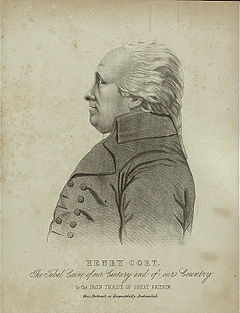Henry Cort
| Henry Cort | |
|---|---|

Henry Cort
|
|
| Born | about 1740 unknown |
| Died | Friday 23 May 1800 |
| Nationality | English |
| Occupation | Inventor, pioneer in the iron industry |
| Known for | Inventions relating to puddling and rolling in the manufacture of iron. |
| Children | Richard Cort |
Henry Cort (?1741 – 23 May 1800) was an English ironmaster. During the Industrial Revolution in England, Cort began refining iron from pig iron to wrought iron (or bar iron) using innovative production systems. In 1783 he patented the puddling process for refining iron ore.
Little is known of Cort's early life other than that he was possibly born in Lancaster, England although his parents are unknown. Although his date of birth is traditionally given as 1740, this can not be confirmed and his early life remains an enigma. By 1765, Cort had become a Royal Navy pay agent, acting on commission collecting half pay and widows' pensions from an office in Crutched Friars near Aldgate in London. At that time, despite Abraham Darby's improvements in the smelting of iron using coke instead of charcoal as blast furnace fuel, the resultant product was still only convertible to bar iron by a laborious process of decarburisation in finery forges. As a result, bar iron imported from the Baltic undercut that produced in Britain, (increasingly from Russia) at considerable expense.
In 1768, Cort's second marriage was to Elizabeth Heysham, the daughter of a Romsey solicitor and steward of the Duke of Portland whose estates included Titchfield. whose uncle William Attwick although a successful London attorney had inherited the family ironmongery business in Gosport which supplied the navy with mooring chains, anchors and hundred of different items of ironmongery.
In 1780, the Royal Navy's Victualling Commissioners agreed with Cort, who had taken over Attwick's business, to re roll iron hoops for their barrels. This led to Cort investing in a new rolling mill at Fontley in Titchfield which was later used for the production of bar iron. Short of funds, he turned to Adam Jellicoe, at that time chief clerk in the pay branch of the Royal Navy, who agreed to finance Cort to the amount of nearly £30 000 on seemingly little security beyond the value of the business As part of the arrangement Jellicoe's son Adam became a partner in the Fontley Works. The deal was later to have unfortunate repercussions for Cort
...
Wikipedia
